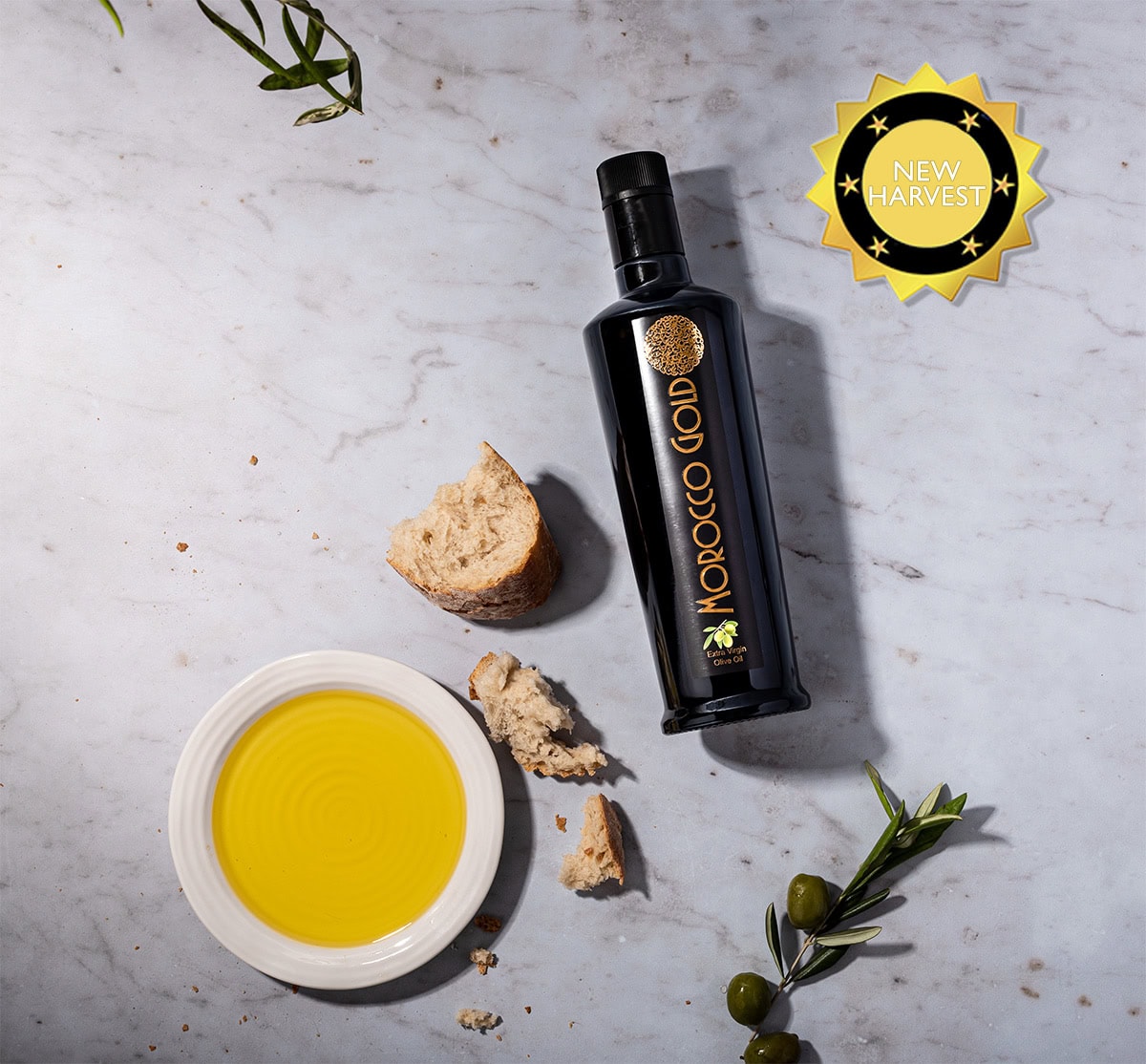Explore the health benefits of our new harvest Morocco Gold extra virgin olive oil (EVOO). Packed with health enhancing polyphenols, it supports heart health, digestion, and more.
Updated April 1st 2025
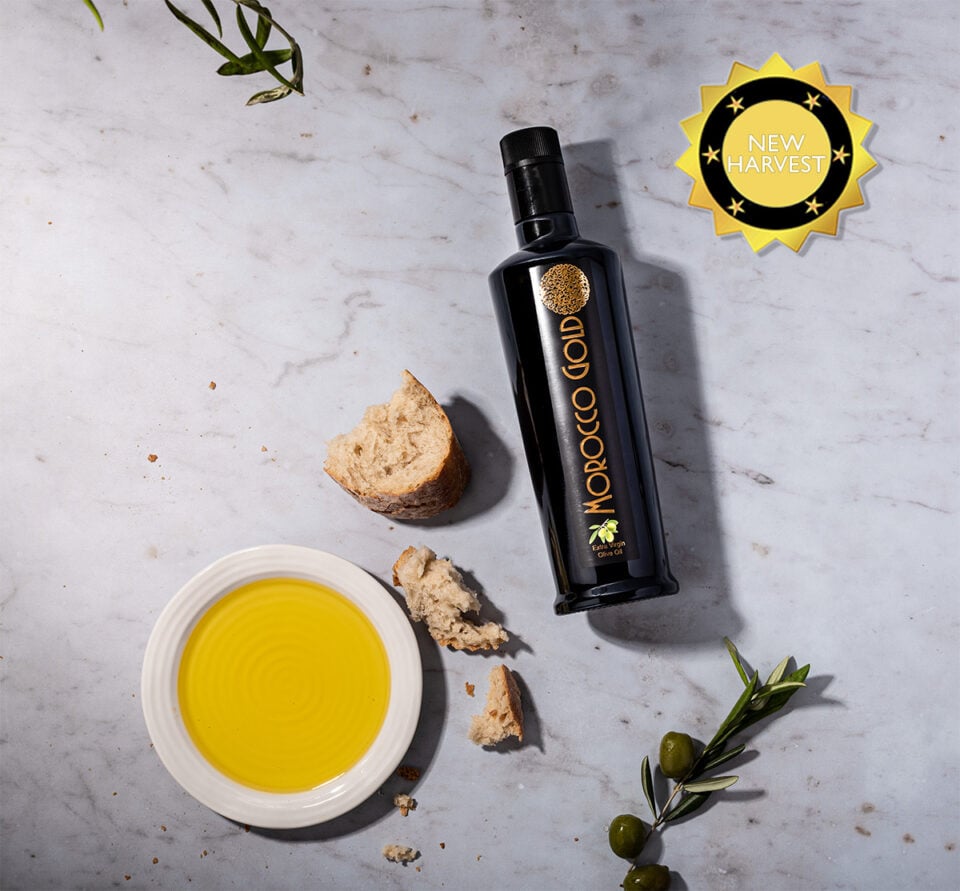
Summary
- We are delighted to announce that the New Harvest of Morocco Gold extra virgin olive oil (EVOO) is now available.
- Moroccan extra virgin olive oil (EVOO) is gaining popularity amongst health-conscious consumers with Morocco Gold extra virgin olive oil (EVOO) leading the way. This rare and exquisite extra virgin olive oil is known for its intense and delicate flavor, texture, and aroma.
- The oil is made from the first pressing of Picholine Marrocaine olives, which is why it is called “extra virgin.” Morocco Gold extra virgin olive oil is richer in nutrients and antioxidant polyphenols than the other types of olive oil, making it a healthy and nourishing addition to your diet.
Contents
Morocco Gold Extra Virgin Olive Oil New Harvest
| Low Acidity | 0.37% |
| Total Polyphenols | 652 mg/kg |
When it comes to extra virgin olive oil, freshness, quality, and health benefits matter. That’s why we’re thrilled to announce our new early harvest extra virgin olive oil, from the foothills of the Atlas Mountains in Morocco is now available. Packed with an abundance of health-enhancing polyphenols and a flavor profile that will elevate every dish, this is not just an extra virgin olive oil—it’s liquid gold.
But what makes this extra virgin olive oil truly exceptional? The timing of the harvest plays a pivotal role in determining the oil’s flavor, nutritional profile, and overall quality. Our Moroccan extra virgin olive oil comes from olives picked early in the season, when the fruit is young and brimming with nutritional goodness, in particular polyphenols. While early harvest oils tend to yield less and are, therefore, rarer, they offer a fresh, robust flavor and significantly higher polyphenol content compared to ordinary olive oils, that deliver significant health benefits.
Our aim with Morocco Gold is always to bring the highest quality extra virgin olive oil from this amazing new source to health conscious food lovers – worldwide. We know that as well as the exquisite taste, its distinctive green fruitiness, hints of sweet almonds, fresh herbs and turf, our customers also value the many health benefits delivered by its high polyphenol content.
The specific soil conditions of the Beni Mellal region, together with the mild winters and summers caressed by hot winds from the Sahara, make ideal growing conditions for growing the Picholine Marrocaine, the only type of olive used for Morocco Gold. The existence of centenary trees and traditional presses (maasras) testify to the longevity of olive cultivation in this area.
Olives from the Beni-Mellal region have been grown for centuries using traditional farming methods. The exceptionally high quality of Morocco Gold extra virgin olive oil is the result of care and attention to detail throughout the entire production process.
How Morocco Gold Extra Virgin Olive Oil Olives Are Grown
Groundwork and tillage are carried out once or twice a year: once in winter to facilitate rainwater infiltration into the soil, and in spring to rotate the soil.
Any planting is done at the beginning of spring. There is some permitted intercropping of cereals, also almond trees, that contribute to the hint of almonds in Morocco Gold extra virgin olive oil.
In addition to natural rainfall, which is generally sufficient in the geographical area, trees are irrigated as needed during the period of vegetation of the olive tree, normally until the end of September.
Fruiting sizing and assessment of the maturity of the olive are carried out annually. The planned date of harvest is agreed based on the maturity index of the olives also the generations of experience of the olive farmers. Harvesting will then normally take place between the end of October and beginning of December.
When To Harvest Morocco Gold Extra Virgin Olive Oil Olives
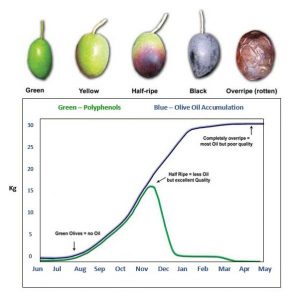
If you’re a farmer, the word harvest elicits myriad emotions. Feelings range from stress to anxiety to relief and to hope and joy. And if you are fortunate enough to allow yourself a few spare moments during this exhausting season, you might just find yourself overwhelmed with a feeling of contentment and satisfaction rarely found in our modern world.
Determining when to harvest is not an exact science. It is an amalgam of a number of factors such as the desired olive oil yield, intended level of antioxidants, and, of course, the desired flavor profile.
It is important to strike the right balance for our Morocco Gold customers. Our aim is to combine the taste characteristics of a premium extra virgin olive oil, young and fruity, with the health enhancing polyphenols to create an extra virgin olive oil that is well balanced and not too ‘aggressive’ when taken on its own. The following illustrates the balance between maturity of the olive, the likely yield of oil and most importantly, the level of polyphenols achieved.
Our olives are picked early in the season when the fruit is young and green. This delivers a more intense, aromatic and complex colour, smell and flavour as well as a higher level of polyphenols. This gives Morocco Gold extra virgin olive oil more intense organoleptic properties.
As the fruit matures, the colour changes to red through to black. As it matures, the more oil juice will have formed and yields of olive oil will be higher. Many producers consider it better to have higher yields, however as shown, as the quantity of oil produced increases, the level of polyphenols will be lower.
A key to achieving this balance is the generations of experience of our olive growers, the care and attention they pay to their crop throughout the whole growing season, and the dedication and attention to detail paid during the harvesting process. We have been extremely fortunate to work with local experts to determine the exact right time to harvest.
Harvesting Morocco Gold Extra Virgin Olive Oil Olives
Harvesting requires a lot of preparation and planning including having our dedicated team of women harvesters, the ‘sisterhood’ ready and eager, the harvesting equipment in working order, transportation arranged to carry our olives to the mill, are just a few of the preparations that need to be in place.
Morocco Gold olives are harvested by hand using flexible combs. Nets and tarpaulins are placed on the ground to avoid contact between the olives and the ground.
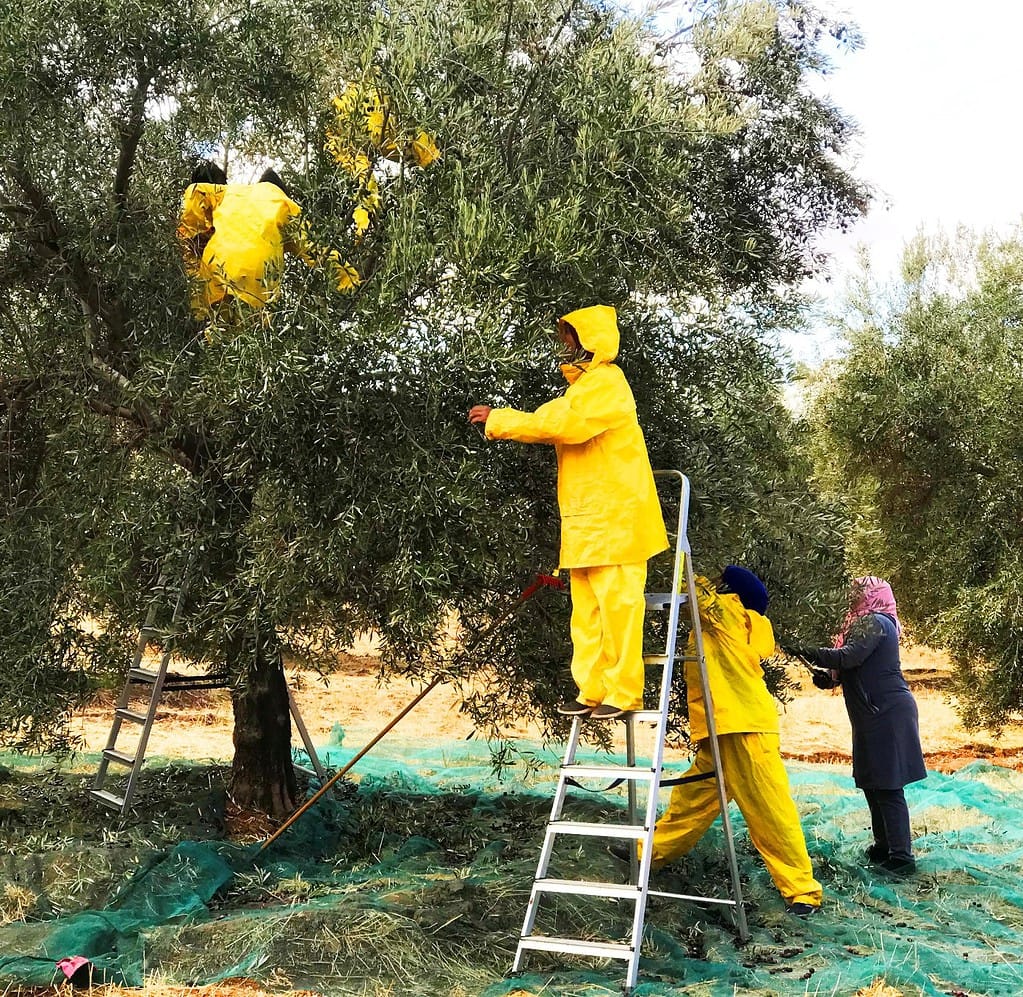
When you see those first mounds of olives accumulating in the harvest trays, it’s a magical moment. It’s like you’ve been transformed into the richest person in all the land. Yet we all know that none of us are in this business for the money – it’s about the richness of the journey. The thing that I have been working for all year is finally coming to fruition. Incidentally, the word itself derives from the Latin fruit (“to use, enjoy”) and fruit (sense of “act or state of bearing fruit”). When the fruit is finally being plucked off the trees and collected into trays for milling, it is truly a joyous occasion. There’s a sense of excitement around your hopes for a solid yield with superior flavor.
Aerated boxes are used for the immediate transport of the harvested olives from the orchard to the crushing unit. On receipt, the olives are checked to ensure their quality, in particular color and appearance, any defective or malformed olives.
The olives will then pass through a stripper to remove any impurities. They are then washed and drained before processing. Leaf stripping and washing eliminate impurities, whether of vegetable origins such as leaves, twigs, or mineral matter such as dust, earth, stones, and other solids. Washing improves not only the quality of the product but also extraction efficiency.
Extraction of oil is carried out in a continuous two-phase process. This minimizes handling of the olives and maintains strict control of hygiene.
Grinding of the olives is carried out using a metal hammer mill which is made of stainless steel. The paste obtained then undergoes a kneading or malaxation process which is the fundamental operation to separate the solid and liquid phases. This kneading operation is carried out for 40 to 50 minutes at temperatures not exceeding 28 ° C. In this way, the extracted oil may be labeled: cold-extracted oil or cold-pressed oil.
The well-kneaded dough is sent to a horizontal decanter where the continuous and simultaneous separation of the oil and wet cakes is achieved by a combination of centrifugal force and of the rotation of a conveyor screw which rotates inside the bowl.
The sense of anticipation grows as the olives are delivered to the processing plant, unloaded into receiving the hoppers, passed through strippers to remove any impurities, and then washed and drained before processing. They are then crushed, turned in malaxers, and spun in high-speed centrifuges to separate out the olive oil.
At last, the ‘liquid gold’ begins to pour into the final vessel. It is at this point that a tasting cup is eased into the stream for the first sample of the season’s olive-appreciated oil.
As the cup is lifted, there is a pause whilst the fresh aroma that wafts through the air is appreciated. This gives the first indication of the level of fruitiness. The olive oil is then sipped, coat the inside of the palates with viscous oil to assess the taste – is it bitter or mild? The greater the bitterness, the higher the level of antioxidants. When swallowed, is there the characteristic ‘bite’ or pepperiness in the back of the throat, an indication of the oil’s pungency, also a level of antioxidant polyphenols.
The time between harvest and pulping does not exceed 24 hours. Morocco Gold extra virgin olive oil is unfiltered to retain all of its natural properties and goodness. Nothing is added or taken away so that it is the result of the soil, the sun, and the rain only.
It is an incredibly rewarding and enriching experience to know when harvesting is underway and that the new harvest of Morocco Gold will shortly be available. It is also incredibly rewarding to be part of a wholly natural process that has lasted for centuries.
Every aspect of olive production ultimately affects the oil itself: the growing region (climate, altitude, soil character), methods of growing, harvesting, and transporting the fruit, as well as extraction and storage methods. The care that is taken in each of these steps not only affects the taste and quality of the olive oil but its cost, yield, and shelf life.
Morocco Gold Extra Virgin Olive Oil Harvesters: The Sisterhood
Morocco’s agricultural sector employs approximately 40% of the nation’s workforce, nearly half of whom are women. Participating in local farming empowers Moroccan women, giving them influence over household income and expenditures. These jobs help to reduce rural poverty at least twice as effectively as other initiatives, both raising household incomes and lowering food costs.
Morocco Gold works with a co-operative that provides local women with business and educational opportunities. The group, which also grows almonds and walnuts, extracts, and sells oils locally and regionally. With the revenue earned from these endeavors, many members are able to pay for their children’s education and help fund community infrastructure in remote villages, slowing rural de-population into cities like Fez and Marrakech.
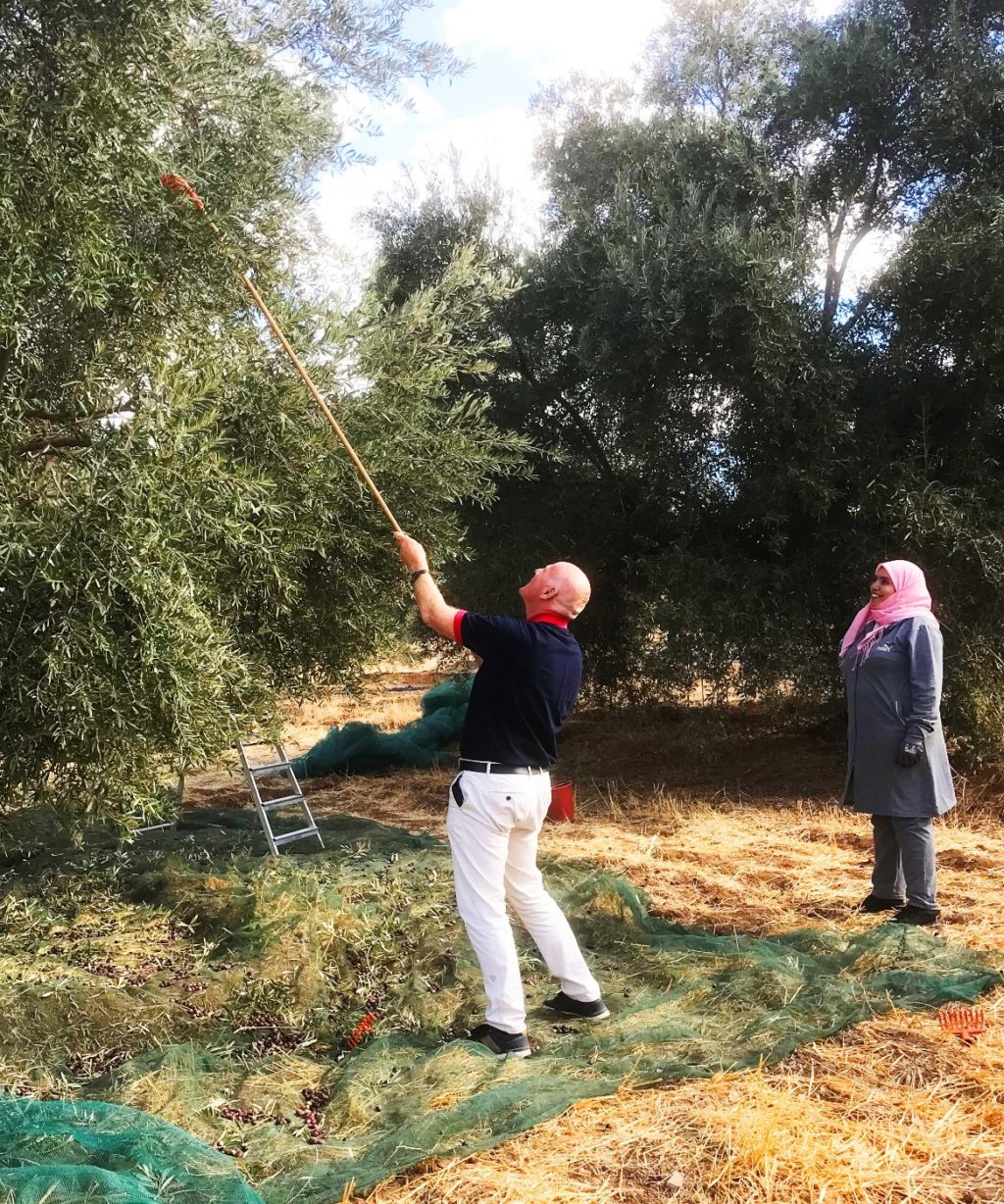
At the end of a busy harvesting day, these harvesters return home to sip mint tea with their families. They share khobz, a typical round loaf cooked in a wood oven, paired with garlic scented green and black olives. The ingredients these women use to make traditional dishes like bessara – fave bean soup with olive oil, cumin, and paprika – come from nearby, sometimes from their own gardens.

